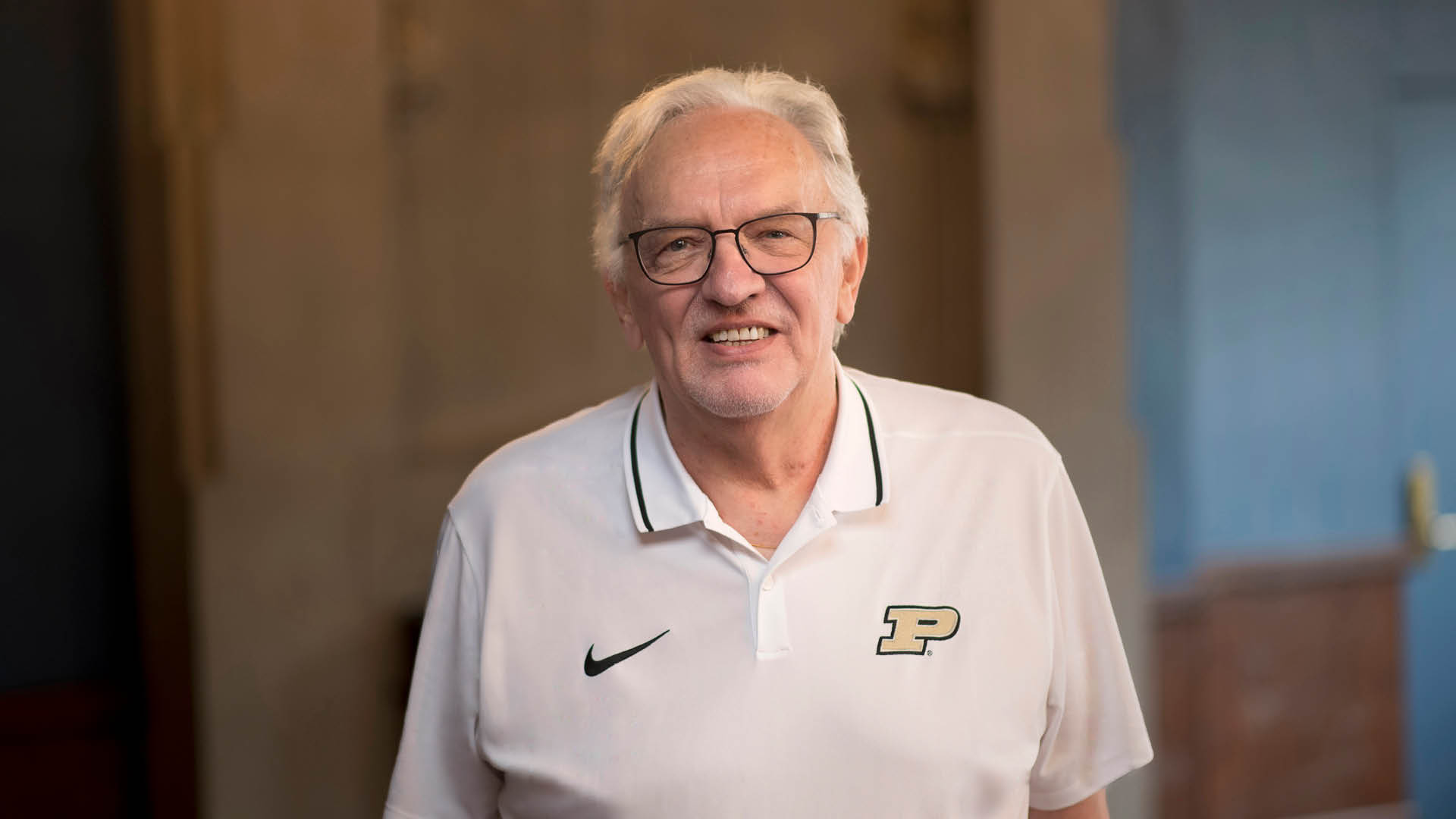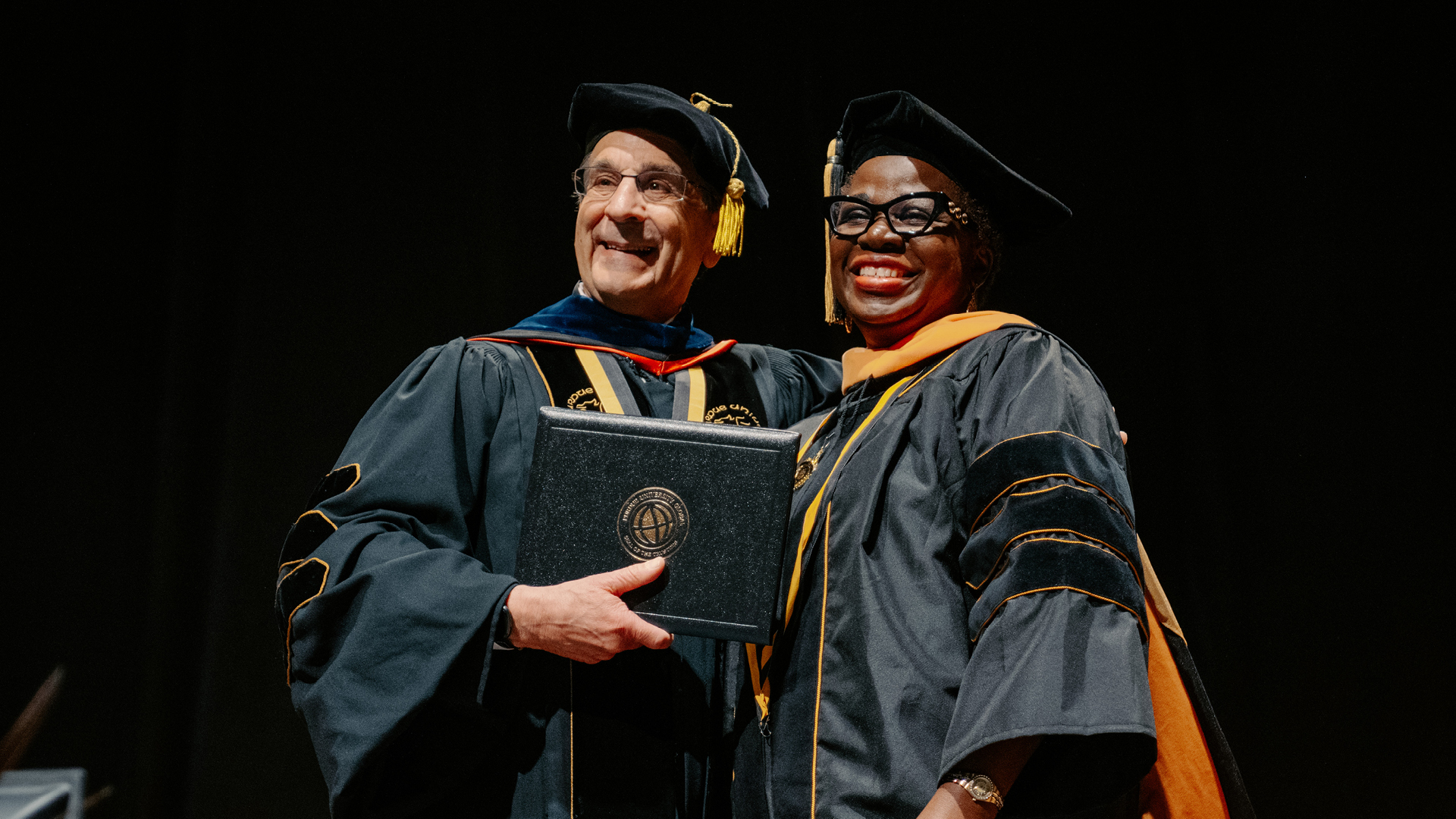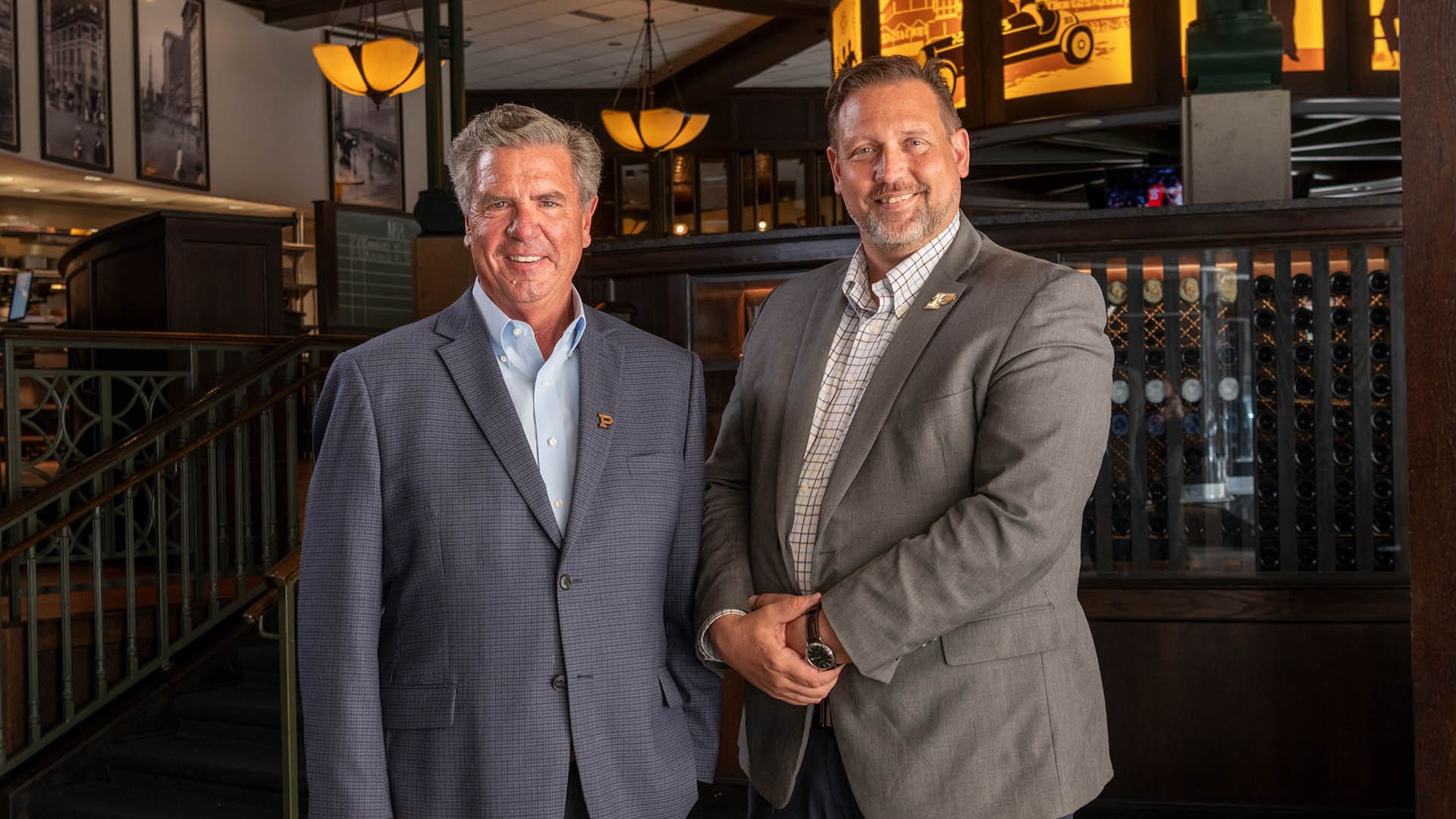Boilermakers have played and sung ‘Hail Purdue’ across the globe — and even in space
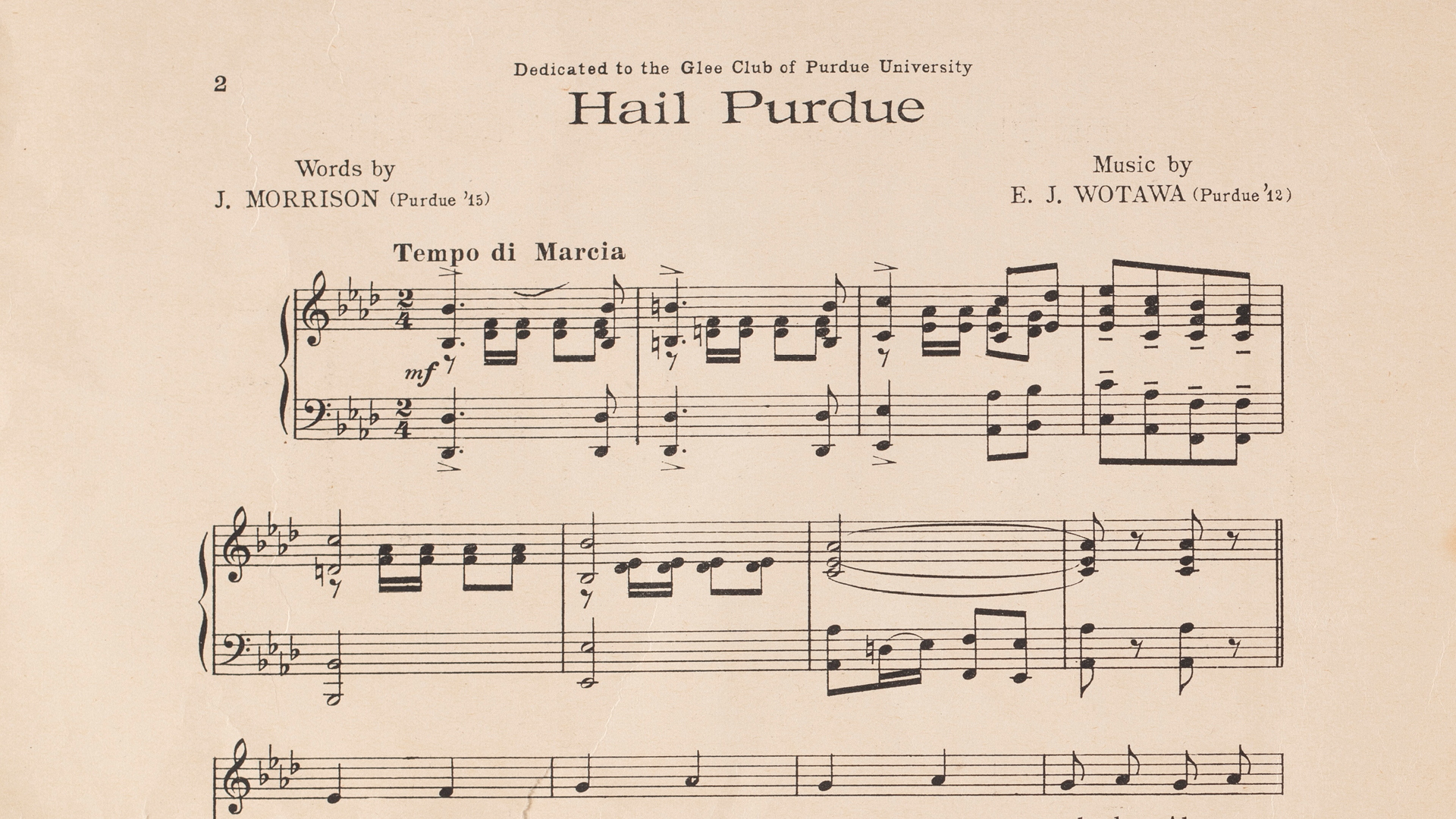
Purdue fight song ‘Hail Purdue’ celebrates its 110th anniversary in 2022. (Image courtesy of Purdue Archives and Special Collections)
Beloved fight song, celebrating its 110th anniversary in 2022, and school song ‘Purdue Hymn’ are the centerpiece numbers in the Purdue musical catalog
Wherever and whenever Purdue Boilermakers cross paths, there exists the distinct possibility that they might break into song while hailing their old gold and black.
Such is their love for the University, as expressed through its most recognizable tune, “Hail Purdue.”
“It’s the one thing that when you see another alum out and about, you hear those words called out: ‘Hail Purdue’ or ‘Boiler up, Hammer down, Hail Purdue,’” says Bill Griffel, the Albert P. Stewart Director of Purdue Musical Organizations and the Jack Calhoun Director of the Purdue Varsity Glee Club.
Purdue’s fight song has been sung, performed, hummed or referenced in every corner of the globe, from Mackey Arena to Westminster Abbey to the Great Wall of China and many points in between.
“The places this song has been performed are amazing,” says Purdue historian John Norberg, author of eight books about the University. “It’s been played all over the world because Purdue Musical Organizations and the ‘All-American’ Marching Band have traveled all over the world. And when they go, they play that song again and again and again. It’s a well-traveled song.”
So well-traveled, in fact, that it has even been played in space.
Purdue astronaut Don Williams took a recording of the fight song with him aboard space shuttle Discovery to play during its STS-51-D mission in 1985. And when he returned to space in 1989 aboard space shuttle Atlantis, NASA mission control awakened Williams and his crewmates (including fellow Boilermaker Mike McCulley) on the second day of their STS-34 mission by playing “Hail Purdue” as a musical wakeup call.
“I knew Don Williams very well and I know darn well that he sang along,” Norberg says. “Like all of us, he couldn’t hear that song without joining in the singing.”
Origin of ‘Hail Purdue’
Boilermakers have enthusiastically clapped and sung along with the song for 110 years now, ever since lyricist James Morrison asked his former Purdue Varsity Glee Club associate Edward J. Wotawa to set his words to music in 1912.
In 1957, the Purdue Alumnus invited Wotawa to explain how the song came into existence. The composer shared that the song was “immediately met with popular favor” after Morrison asked the Glee Club to sing it at a University chapel service, adding that it was soon adopted as Purdue’s official fight song.
“To say that I am proud would be putting it mildly,” Wotawa wrote. “To think that this song has survived through the years and that it has been sung at every University function … I am thankful that it happened to be my lot to write the melody which has been so closely associated with that great Purdue spirit through the years. My chest is swelled and my head is bowed.”
Boilermakers’ appreciation for “Hail Purdue” has not faded in more than a century, as alumni consistently rise to their feet to join in when PMO singers close each concert by performing the fight song.
“For the greater Purdue community, it’s the most important song we play or sing when at a sporting event or with gathered alumni,” Griffel says.
Adds Norberg: “Every time something good happens at Purdue, we sing, ‘Hail Purdue.’ When events happen, when we score a touchdown, when we’re doing something good in a basketball game, the band plays it. PMO sings ‘Hail Purdue’ and everyone stands up and claps and gets into the spirit of the thing. The song means a lot to Purdue people.”
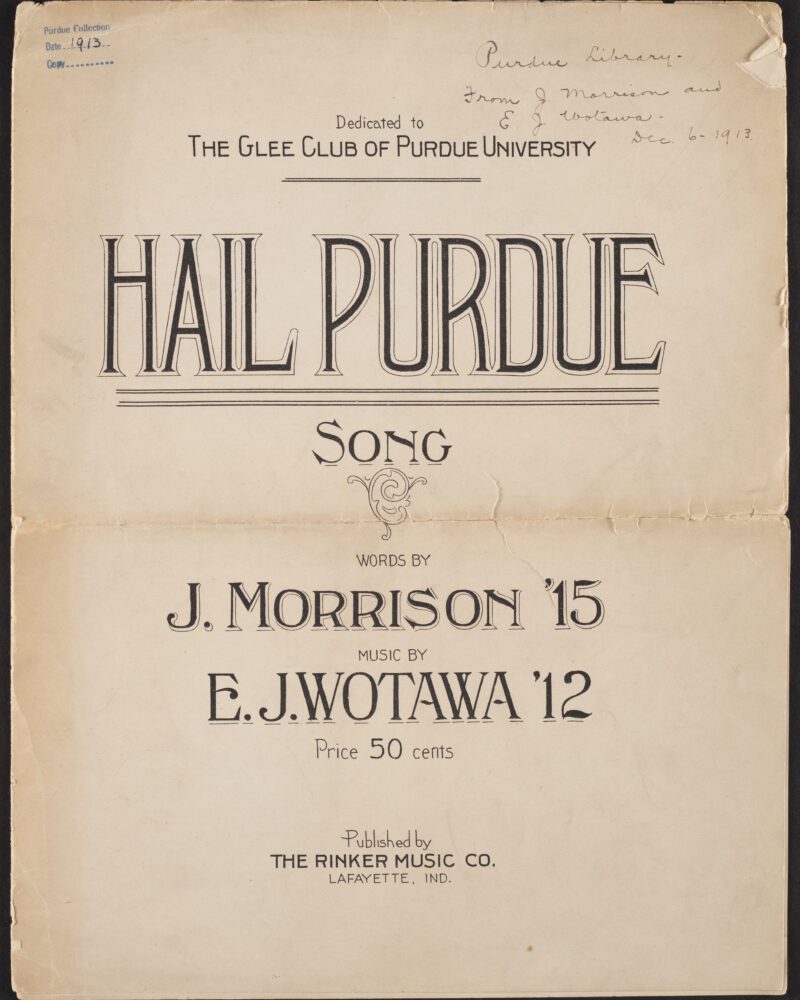
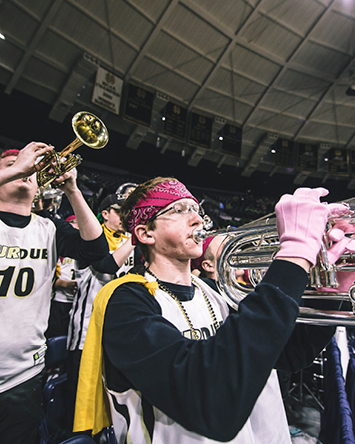
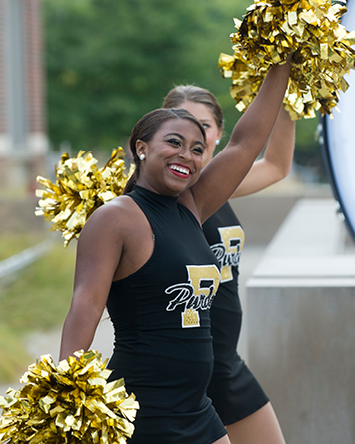
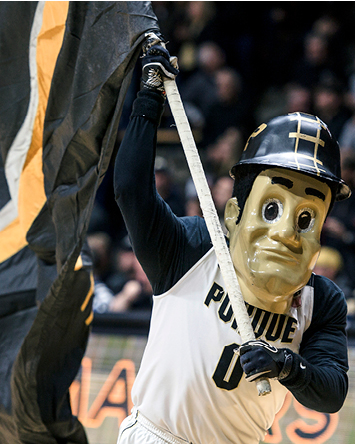
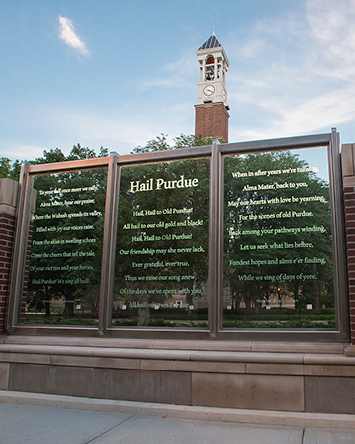
‘Purdue Hymn’ becomes official alma mater
In contrast to the immediately beloved fight song, the University’s alma mater, “Purdue Hymn,” followed an atypical path toward becoming a primary selection in the Boilermaker musical catalog.
Alfred B. Kirchhoff penned the song in 1941, and the University Choir first performed it two years later during a convocation in the building now known as Elliott Hall of Music. But it was not until 1993 that the Purdue Board of Trustees approved the song as the official alma mater.
Norberg says President Steven C. Beering pushed to adopt “Purdue Hymn” as the alma mater following many years in which Purdue’s musical groups had performed the song infrequently.
According to Norberg, Beering decided in the early 1990s that Purdue needed a proper alma mater like other universities. In a conversation with then-PMO director Brian Breed, Beering proposed creating one, only to learn that “Purdue Hymn” already existed and could serve that purpose.
“Brian said, ‘Well, we do have an alma mater. We have the “Purdue Hymn,” and the band plays it sometimes and PMO sings it sometimes, but it’s not officially the song.’ He introduced Beering to the song, and Beering loved it,” Norberg says. “So, at a Board of Trustees meeting, he brought some Glee Clubbers in, some people from PMO, and they sang the ‘Purdue Hymn.’ Beering told me there was not a dry eye in the house.”
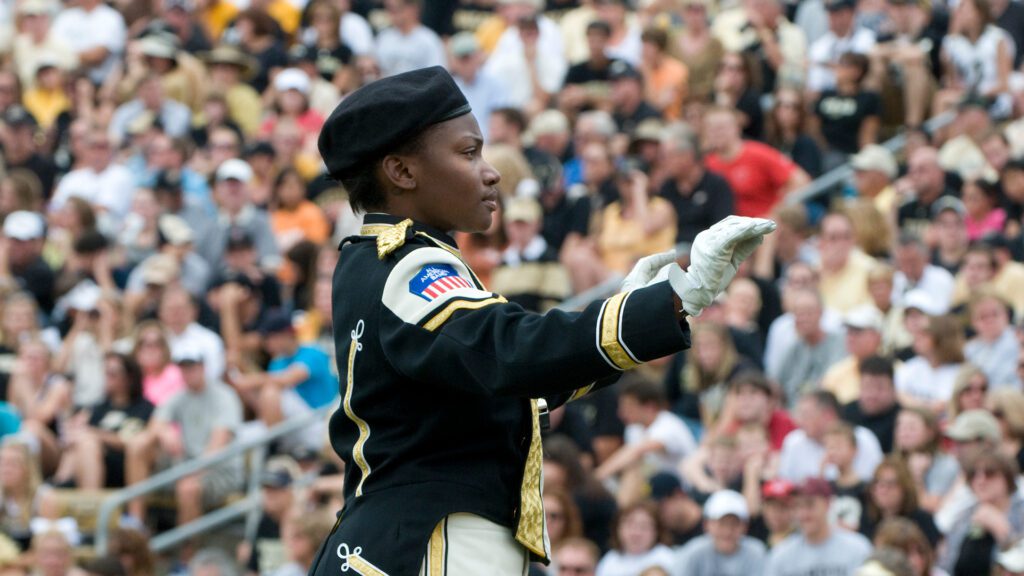
With reverential lyrics honoring Purdue, the alma mater is a sentimental complement to “Hail Purdue,” but the two songs are entirely different in tone. For that reason, “Purdue Hymn” has emerged as a go-to song for serious occasions, leaving the upbeat “Hail Purdue” to inject energy into lighter moments.
“If the fight song is the rallying call, then ‘Purdue Hymn’ is the one that makes people reflect,” says Colton Withers, PMO’s associate director and director of administration and external relations. “It’s a little more solemn. It brings back sentimental feelings for alumni.”
Withers recalls PMO singers performing the song at the 2010 funeral of Purdue’s eighth president, Arthur G. Hansen, the first Purdue alumnus to serve as president.
“We hummed the last few verses again as we exited,” Withers says. “It was a very moving experience.”
Adding to Purdue tradition
Even if the two songs took vastly different routes toward acknowledgement as official Purdue tunes, both the fight song and the alma mater now enjoy sacred status among Boilermakers who appreciate their sentiment and places within University lore.
A traditional chant by “All-American” Marching Band members while performing “Hail Purdue” even contributed to the emergence of the University’s most recognizable rallying cry.
For many years, band members had shouted “Fire up!” following the section of the fight song that states, “Ever grateful, ever true, thus we raise our song anew.” But after Joe Tiller’s 1997 arrival as Purdue’s football coach, his wife, Arnette, suggested that fans instead chant “Boiler up!” at that point in the song in an effort to generate excitement. Joe Tiller had previously encouraged his players at Wyoming via the expression, “Cowboy up!”
Sure enough, “Boiler up!” caught on among Purdue fans. Today, it is as ubiquitous among Boilermakers as the fight song that helped bring it to prominence.
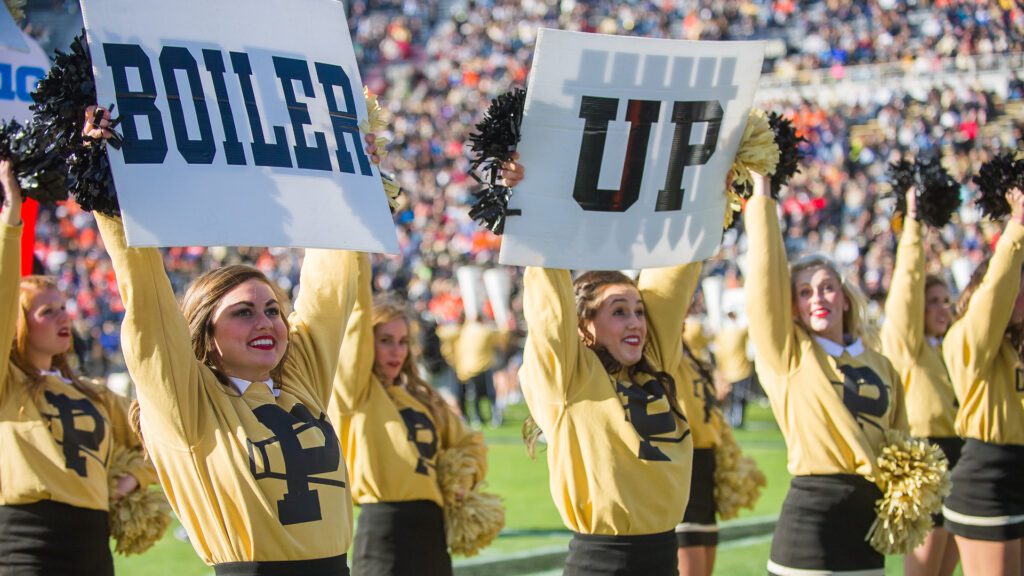
We had great football teams back then, so there was a lot of enthusiasm, and ‘Boiler up!’ caught on. And still it catches on,” Norberg says. “My wife and I travel as much as we can, and I don’t care if we’re in another country or if we’re at Disney World in Florida, if I have a Purdue cap or shirt or jacket on and another person from Purdue sees it, what do they say? ‘Boiler up!’ Every time.
“It’s fun because we have that common bond, and these two songs are also part of our common bond.”
Edward J. Wotawa’s Letter to the Purdue Alumnus
November 1957 Issue
I’m flattered! You asked me to say something about how “Hail Purdue” happened to be written. That meant that I’d have to delve into the archives of memory to exhume the original happenings. To have a memory implies that one has a mind. But my memory is very bad! So I’m flattered. Actually, there is not much to tell. James R. Morrison (“Jimmie”), Sci ’17 (who passed on in 1929) wrote to me back in 1912, following my graduation, saying: “We are in dire need of a war song and I have, therefore, indited the following lyrics with the hope that you will set them to music in order that they may be sung in Chapel.” (Incidentally, Jimmie was a true poet — not just a rhymester.) At this point, let me say that Jimmie’s lyrics were so good that more acclaim is due him than has been given him; acclaim which he so richly deserves. In fact, his lyrics were so good that in just reading them, one would naturally “sing song” them. Hence, it was not difficult to set them to music. After a few readings, a melody just naturally seemed to evolve. Accordingly, I made an arrangement for Piano and Voice and one for Male Chorus and sent them to Mr. Morrison.
He, in turn, as I remember him telling, gave it to the then existing Glee Club and had it sung at Chapel where it immediately met with popular favor. Subsequently it was adopted as the official Purdue Song. As I recall, this adoption was effected by either the Trustees or some official body. Jim had told me about this in one of his letters but at this moment I cannot say positively.
And that’s the story! To say that I am proud would be putting it mildly. To think that this song has survived through the years; that it has been sung at every University function; that it has been “borrowed” by other schools; and that after all these years it was used as the basic theme of the marvelous “Purdue Rhapsody,” is unbelievable. (Mr. Walters, composer of the “Rhapsody,” has done a beautiful piece of work.) Of course I’m proud! But I’m humble too. Such acclaim for having done so little naturally provokes humility. And I am thankful. Thankful that it happened to be my lot to write the melody which has been so closely associated with that great Purdue Spirit through the years. My chest is swelled and my head is bowed.
Sincerely,
E.J. Wotawa
P.S., I’ve just recently returned from the 1957 Gala Week during which I attended the 45th anniversary of the graduation of my class — 1912. It was wonderful. The 1957 Gala Week Show with that amazing Glee Club, the Variety Band and the Symphonic Band were all superb, beggaring description or comparison. But what else can one expect? It was Purdue, wasn’t it? And many thanks for the fine attention and help given me by the Alumni Association. (During Gala Week 1952, Mr. Wotawa was the recipient of the Distinguished Alumni Award.)
